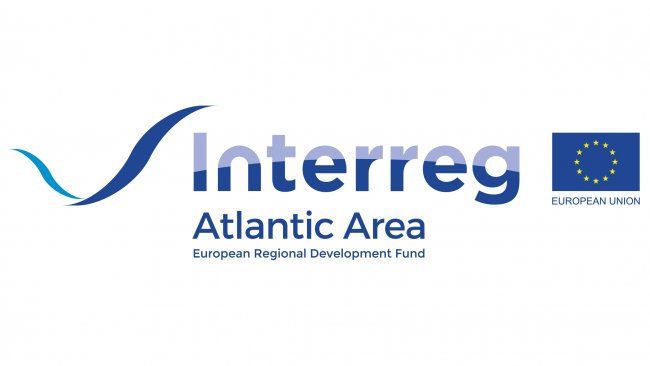INTERREG Atlantic Area

As part of the European Union’s cohesion policy, INTERREG Atlantic Area supports transnational cooperation projects in 38 regions of five Atlantic countries: France, Ireland, Portugal, Spain and the United Kingdom, contributing to the achievement of economic, social and territorial cohesion.
The overall objective is to implement solutions to answer to regional challenges in the fields of innovation, resource efficiency, environment and cultural assets, supporting regional development and sustainable growth.
With a total budget of EUR 185 million, which comprises a fund allocation above EUR 140 million from the European Regional Development Fund (ERDF), the Programme focuses on four main priorities axes and specific objectives related:
1. Stimulating innovation and competitiveness, addressing the challenge of accelerating intelligent growth
- 1.1 Enhancing innovation capacity through cooperation to foster competitiveness
- 1.2 Strengthening the transfer of innovation results to facilitate the emergence of new products, services and processes
2. Fostering resource efficiency, promoting renewable energies and energy efficiency
- 2.1 Fostering renewable energies and energy efficiency
- 2.2 Fostering green growth, eco-innovation and environmental efficiency
3. Strengthening the territory's resilience to risks of natural, climate and human origin, to support a better protection and management of the territory
- 3.1 Strengthening risk management systems
4. Enhancing biodiversity and the natural and cultural assets will serve the identified need of protecting the environment and promoting the cultural and natural identity
- 4.1 Improving the protection of biodiversity and ecosystems’ services
- 4.2 Enhancing natural and cultural assets to stimulate economic development
Cooperation Area
The Atlantic Area covers the western part of Europe bordering the Atlantic Ocean. It comprises 37 regions from the western part UK, Ireland and Portugal as well as the northern and south westernmost part of Spain and western France.
The Programme covers an expanded area compared to the previous Programme (2007-2013) due to the inclusion of new regions: Canary Islands (Spain), the Autonomous Regions of the Azores and Madeira (Portugal). The participation of the three insular regions will contribute to a more cohesive Atlantic Region, increase its natural and cultural heritage and enhance its comparative advantage related to its maritime perspective.
- France/ Haute-Normandie, Basse Normandie, Pays-de-la Loire, Bretagne, Poitou-Charentes, Aquitaine
- Ireland/ Border, Midland and Western, Southern and Eastern
- Portugal/ Norte, Algarve, Centro, Lisboa, Alentejo, Açores, Madeira
- Spain/ Galicia, Principado de Asturias, Cantabria, Navarra, País Vasco, Andalucia (Huelva, Cádiz and Sevilla), Islas Canarias
- United Kingdom/ Cumbria, Cheshire, Greater Manchester, Lancashire, Merseyside, Gloucestershire, Wiltshire and North Somerset, Dorset and Somerset, Cornwall and Isles of Scilly, Devon, West Wales and The Valleys, East Walles, South Western Scotland, Highlands and Islands, Northern Ireland
Programme Management
- Monitoring committee (MC)/ The Monitoring Committee is the main decision making body of the Programme. It is composed by representatives of the five Member States and regions, authorities of the Programme, and representatives of other administrations and organised civil society as advisory members.
- National Correspondents (NC)/ The National Correspondent is the body ensuring the representation of the Member State in the management structure of the Programme and supporting partners at national level. It is responsible for the dissemination, implementation and management of the Programme at national level.
- Managing Authority (MA)/ The Managing Authority is responsible for the Programme implementation and its overall management ensuring both institutional representation and compliance with applicable Community and national rules namely, eligibility rules, information and publicity, monitoring and assessment procedures. Since 2007, The North Regional Coordination and Development Commission (CCDR-N) is the Programme MA.
- Joint Secretariat (JS)/ The Joint Secretariat (JS), based in Porto, Portugal, is the main Programme contact point for beneficiaries and it is in charge of the daily management of the Programme, it assists the Managing Authority and whenever necessary the other Programme bodies on Programme implementation.
- Certifying Authority (CA)/ The Certifying Authority is Agência para o Desenvolvimento e Coesão. It is responsible for the expenditure certification and ERDF assistance payments processes.
- Audit Authority (AA)/ The Audit Authority is the body that coordinates and implements the sampling audits addressed to the Programme management and control system and to the co-financed operations, prepares and presents to EC the annual control reports, and declarations for partial or final closure, assessing the legality and regularity of the expenditure concerned. The AA is assisted by a Group of auditors, which comprises a representative of each Member State.